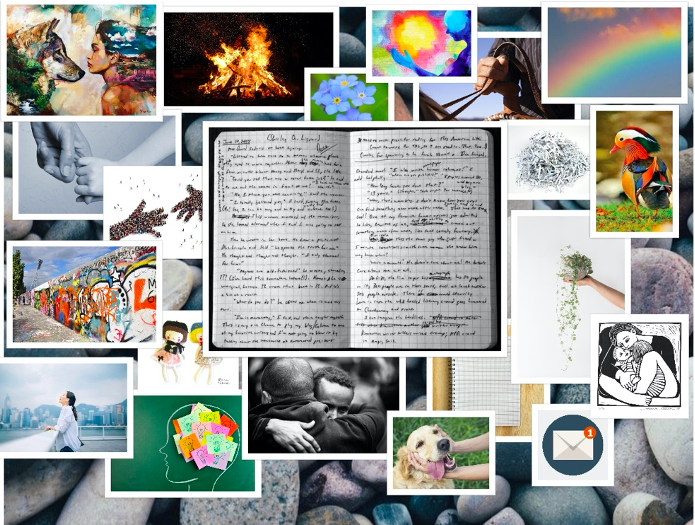It took eighteen years of hits and misses to come to discover the name and mission of my project in 2009. It’s like I had to travel a long road of experimental activism to find it, that name, Time To Tell, and that mission, Sparking stories from lives affected by incest and sexual abuse to be told and heard. You can read my book to see all the twists and turns I found on my path, the gifts, and conflicts, the roadblocks and affirmations.
Once that 15-word mission statement jumped out onto my flipchart, getting ideas from Suzanne and Lor and Linda right here in my studio --- once they popped out of the blue magic marker in my hand, I let out a loud yelp, “That’s IT!” Allow me to repeat: Sparking stories from lives affected by incest and sexual abuse to be told and heard. Make no mistake, many an English major has told me it was not grammatically correct. But, damn the rules, the statement said it right and those two commands: Told and Heard, had to be the clincher. And that wonderful word “Sparking” – how I loved her from the minute she appeared. I’d much rather be sparked than made to do something – natural-born rebel that I am!
Back to Told & Heard, can’t have one without the other, not if you’re about changing the world. And lo, a decade later, the mission is exploding like a Fourth of July fireworks display over the Statue of Liberty.
I’ll give you several beautiful examples. Six months before the pandemic pushed us into our safety caves, I went to a life-changing, life enlarging, gathering of survivors of sexual violence. Twenty of us were seated around a U-shaped table facing The Stories We Tell seminar leaders, Anne Ream and R. Clifton Spargo. We were brought together to write. Write our hearts out about our lived experience. The Stories We Tell is a program of the Voices and Faces Project and the theme was: Writing for Social Justice. We were there to think about how to change the world through our writing.
We had a stack of homework to read before we got there – like Martin Luther King, Jr.’s letter from a Birmingham prison (something I’ve re-read every year in January on MLK Day, just to keep me on track). For two days, we wrote and talked and listened to each other and our leaders – all gaining inspiration and momentum to rid the world of sexual violence by telling our stories and getting them heard.
The sponsoring agency Lotus Legal Clinic took our work to the next level. They gave us an editor to help us refine what we’d written after we got back home (thank you, Deb Brenegan). Then they took our writing to the Milwaukee Institute of Art and Design and invited students to create an artistic reflection of a piece or two of our writing. Wait, there’s more! Lotus had a gallery show, hanging all the art with its accompanying story. And, as if that weren't enough, Austin Reese, Director of Survivor Empowerment at Lotus, produced a beautiful, glossy magazine, its pages filled with everything we had created. It’s called Untold Stories, and you can get a copy here.
Lastly, Lotus produced a Zoom showcase, and with some of us reading of our pieces. You can listen to 5-minute readings done by me here and my sister survivor Carla here and see the art created for them (video created by Michael Snowden).
I thought that was enough, for a while. But my mission has been on a roll – like a long toboggan ride down a slide, lots of legs wrapped around hips, arms around waists, screaming joyfully into the person's back in front of you. A month after the writing for justice gathering, I performed a reading of excerpts from my play and book. I did it with three cameras from Northampton Open Media positioned around a live audience in the Smith College TV studio. The footage awaits the lifting of covid so we can complete the 30-minute production and start distribution. More telling and being heard!!
And from that filming, in Oct. 2019, the Universe delivered yet again. A survivor who's a poet complained to my production partner, Jackie Humphreys, that she had the most challenging time finding venues offering poetry readings to be open and welcoming to material about sexual abuse. Having just helped run the reading I’d done at Smith, Jackie said, "Hey, let's organize a reading for survivors." Kinda like Mickie Rooney telling Judy Garland, "Hey, let's put on a play!" Well, now, one year later, that's what's going to happen. We're bowled over with the dozens of survivors who have submitted their 5-minute pieces of prose and poetry of survival and resilience. We’re calling it Survivors’ Voices: Works of Resilience Written and Read by Survivors of Childhood Sexual Abuse, and it is happening the last weekend of January. Four showcases from Friday, January 23rd through Sunday, January 25th. For everything you need to know, go here.
The river running through all this is the ongoing writing circles Time To Tell offers to survivors. Each session, we gather together on Zoom to write together, read our writing aloud, and give each other feedback on how our writing resonates. We're experiencing multiple opportunities to be both witnesses and actors in telling and being heard — layers upon layers of affirmation and empowerment.
May this new year be healthier and more uplifting for us all.
Thanks for reading,
Donna



